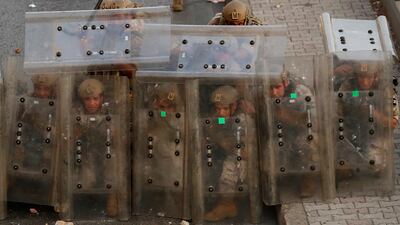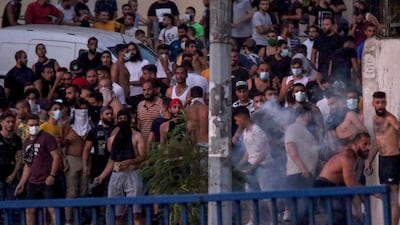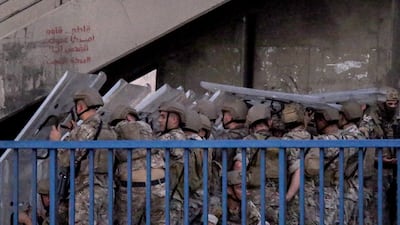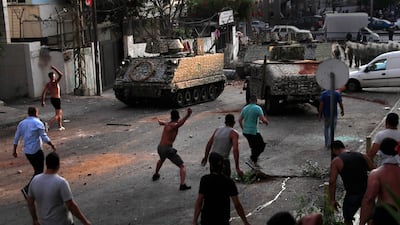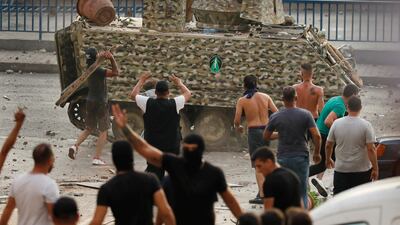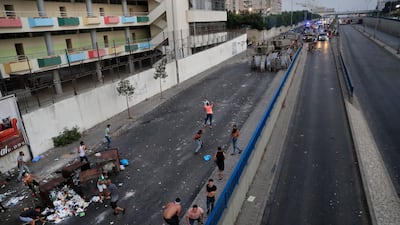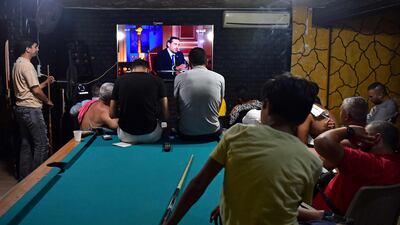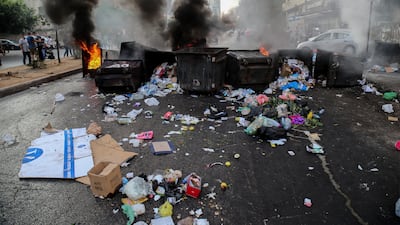Nestled in his highly secure compound in the town of Maarab, Mount Lebanon, the head of the Lebanese Forces Party, Samir Geagea, admits the country has hit rock bottom amid its economic downturn, but cautions against drawing parallels to the civil-war era.
Mr Geagea, whose party holds the second-largest Christian bloc in the Lebanese Parliament, told The National that early elections are the only way out of the crisis.
The Lebanese currency has lost more than 90 per cent of its value since October 2019 and the country is facing dire fuel, medical and electricity shortages.
“Lebanon is at the bottom now. You can see the miserable state of the economy and the daily, unbearable life struggles,” said Mr Geagea, who fought during Lebanon’s civil war and spent 11 years in solitary confinement thereafter.
But to him, despite the level of anger and political paralysis, there is no threat of another civil war. “This is not a 1975 moment in Lebanon. The [economic] struggles of someone in Tripoli [north] are the same of someone in Nabatiyeh [south].”
Instead, he expects more social unrest and popular upheaval in the months to come.
Though Lebanon’s new prime minister-designate, Najib Mikati, is trying to break the year-long political paralysis and form a government, Mr Geagea is not holding out much hope that a Cabinet — if formed — will end the crisis.
“I would assess that there is 50-50 chance for a Mikati government formation. If it forms, it is not going to be that different than [former prime minister Hassan] Diab’s Cabinet.”
Mr Geagea's party has made the decision to stay out of this government.
“This is not about the new prime minister-designate Mikati. It is about the Parliament’s composition and where Hezbollah and [President Michel] Aoun's blocs hold significant influence.”
Through former prime minister Saad Hariri, those blocs have been able to garner the slim majority needed to form a government.
Instead, Mr Geagea is strongly advocating for early parliamentary elections, now scheduled for next May.
“The Lebanese population is fed up. Free and fair early elections can happen and would bring back faith in Lebanon.”
Asked about Hezbollah’s political dominance in Beirut and its rejection of holding early elections, Mr Geagea said Lebanon’s militant group is facing unprecedented challenges.
“Yes, Hezbollah is politically dominant but is showing many cracks and vulnerabilities,” he said. “The events of Shwaya were unprecedented. They happened in the deep south and have exposed a serious crisis for Hezbollah.”
This month, furious residents of the southern town of Shwaya seized one of Hezbollah's rocket-launching vehicles as it attempted to engage in cross-border attacks on Israel. For decades, Hezbollah’s attacks on Israel had gone unchallenged by the local population.
The Lebanese Forces leader argues that though Hezbollah’s military clout extends from Beirut to Sanaa, the party can be politically contained in the parliamentary elections.
Other tools that could be used to leverage change in Lebanon before elections are corruption-related sanctions from the US and Europe, Mr Geagea said.
“US and EU sanctions on Lebanese figures would be helpful in pressuring corrupt figures and enablers of collapse.”
These measures could be announced as soon as this month if no government is formed.
Mr Geagea also advocated more US aid for the Lebanese army — “not equipment but food and resources that help in day-to-day operations.”
Regionally, Mr Geagea is wary of US negotiations with Iran over a return to the Joint Comprehensive Plan of Action (JCPOA), signed in 2015.
“Returning to the old version of the nuclear deal with Iran would be a disaster. Any money that comes into Iran will show up in Lebanon, Iraq, Syria and Yemen. We need to address its regional role,” he said.
Asked about Saudi Arabia’s role and its growing distance from Lebanon’s political affairs over the last two years, Mr Geagea explained Riyadh’s hesitance as being related to failures by Beirut to deliver tangibles.
“There is no ambiguity in Saudi Arabia’s role in Lebanon. They see Lebanon at minimum as being unfriendly and very corrupt on the inside. They need to see tangibles from any future government.”
He describes his relationship with both Saudi Arabia and the UAE as “very good” and is hoping for a restoration of Arab confidence in Lebanon to bring back investment after the elections.
As to the Abraham Accords and whether he thought Lebanon would enter into peace talks with Israel, Mr Geagea opposed that notion.
“The Abraham Accords are a sovereign decision of those countries that signed normalisation with Israel. We don’t want a Lebanon peace agreement before resolving the Palestinian cause.”















